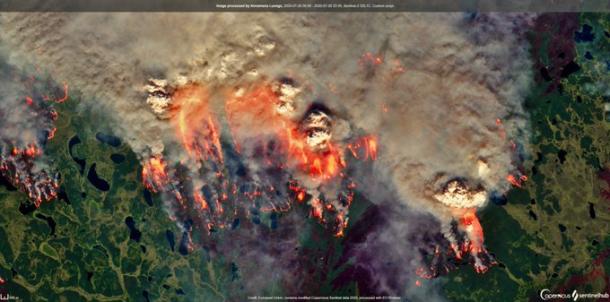WMO warns over devastating Arctic fires and rapidly decreasing sea ice coverage
- July 30, 2020
- Posted by: administrator
- Category: Environmental, Global, Water Issues, Arctic & Antarctica

The World Meteorological Office is warning that exceptional and prolonged heat in Siberia has fuelled devastating Arctic fires – at the same time, rapidly decreasing sea ice coverage has been reported along the Russian Arctic coast.
Temperatures in Siberia have been more than 5°C above average from January to June, and in June up to 10°C above average. A temperature of 38°C was recorded in the Russian town of Verkhoyansk on 20 June. Temperatures in parts of Siberia the week beginning 19 July again topped 30°C.
The prolonged heat is related to a vast blocking pressure system and a persistent northward swing of the jet stream, allowing warm air into the region.
According to a rapid attribution analysis by a team of leading climate scientists, such extreme heat would have been almost impossible without the influence of human-caused climate change.
“The Arctic is heating more than twice as fast as the global average, impacting local populations and ecosystems and with global repercussions. “What happens in the Arctic does not stay in the Arctic. Because of teleconnections, the poles influence weather and climate conditions in lower latitudes where hundreds of millions of people live,” said WMO Secretary-General Petteri Taalas.
For the second consecutive year, fires are raging well inside the Arctic Circle. Satellite images have shown the extent of the burn surface. The fire front of the northernmost currently active Arctic wildfire is now over the 71.6N, less than 8 kilometers from the Arctic Ocean.
Their estimated total carbon emissions since January are the highest in the 18 year-old data record of the Copernicus Atmosphere Monitoring Service, implemented by the European Centre for Medium-Range Weather Forecasts (ECMWF), which is monitoring the fire activity and the resulting pollution to assess its impact on the atmosphere.
“The entirety of summer 2019 was unusual in terms of fire activity at high northern latitudes and 2020 so far seems to be evolving in a similar manner,” said CAMS senior scientist Mark Parrington. “This suggests that we could be seeing intense fire activity continue in the Arctic in the weeks ahead, especially as Boreal wildfire season typically peaks in July and August.”
The Russian Federal Service for Hydrometeorological and Environmental Monitoring (Roshydromet) said that according to satellite monitoring), there were 188 points of probable fire on 22 July on the territory of Siberia.
The fires have been particularly intense in Russia’s Sakha Republic and Chukotka Autonomous Okrug in the far northeast of Siberia, both of which have been experiencing much warmer-than-usual conditions over the past months. Russian authorities have also declared that there is an extreme fire hazard throughout the Khanty-Mansiysk Autonomous Okrug – Yugra which is in western Siberia.
Arctic sea ice decline accelerates
The Siberian heat wave this past spring have accelerated the ice retreat along the Arctic Russian coast, in particular since late June, leading to very low sea ice extent in the Laptev and Barents Seas, according to the available operational products of the U.S. National Snow and Ice Data Center and the US National Ice Centre (NIC). The Northern Sea route appears to be nearly open.
All datasets monitored by WMO’s Global Cryosphere Watch programme concur on the long-term downward trend in Arctic sea ice. This is believed to be affecting weather patterns in other parts of the world, and research is being conducted into whether it is leading to a weaker jet stream, which is associated with blocking patterns such as those which affected Siberia this year.
The melting of ice and thawing of permafrost – thus potentially releasing the greenhouse gas methane – is having a major impact on infrastructure and ecosystems throughout the region.
